
2023 was a hell of a year for games. Sure, there were disappointments: The endless tide of remasters; franchise miscalculations and mis-steps; ongoing concerns about layoffs, labor strife, and other ugly sides of the business of making games. But the games themselves? Exquisite—with this, our listing of the year’s best, carrying at least 3 titles we’d qualify as stone-cold masterpieces, and 17 more that innovated and delighted in equal measure.
It’s a year where not just one, but two remakes of gaming classics served as object lessons in the power of old school design; where indie ideas thrived; where studios that could have been excused for resting on their laurels resisted the urge to do so, and instead embraced their strangest impulses. It’s one of the best years of gaming we’ve seen in as long as we can remember, and it makes us happy, in our own way, to chronicle the artistic heights of the hobby. You don’t have to take our word for it, though: Look through these titles and behold: The 20 best games of a very good gaming year.
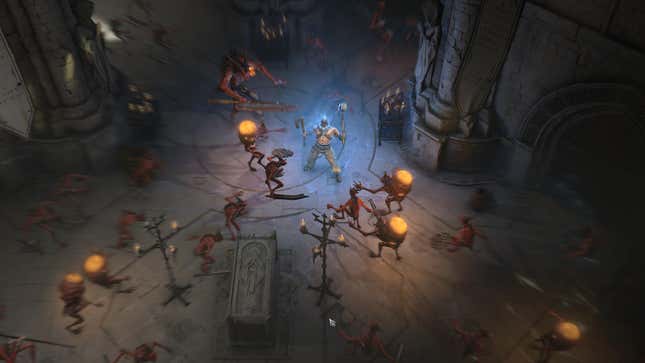
Blizzard’s latest blood-soaked Diablo game triumphs most especially via contrast; in crafting a fast-moving action game where character builds actually matter, the company re-imported much of the rigor, and the horror, that was notably lacking from its previous Diablo III. Bolstered by a great voice performance from Ralph Ineson (who put in similarly strong work in Final Fantasy XVI, which fought for this spot in our rankings), it’s a familiar story married to addictive, compelling play capable of reminding us why cries of “Ahh, fresh meat!” once scared the crap out of gamers of the past. [William Hughes]
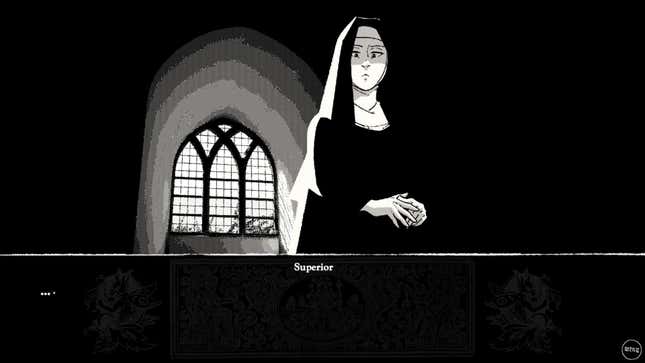
In the devastating visual novel Misericorde from solo developer Xeecee, you play as Hedwig, an Anchoress—a type of nun who is confined to a cell for the entirety of their lives so they can focus strictly on learning and interpreting scripture—in the 1400s. You might be familiar with the concept if you played last year’s excellent Pentiment, another medieval murder mystery set in an abbey. That’s where the similarities end, though. Pentiment gives you choices, lets you lead the investigation; Misericorde just drags you along for the ride as Hedwig leaves her cell for the first time in 20 years. There are moments of levity to be found: the rest of the nuns, many of whom Hedwig has never interacted with before, are all distinct in voice and personality, and it’s a joy to see how these women whose lives are so similar distinguish themselves from one another. But it’s the smaller moments in the game that really stick with you: Hedwig realizing just how much she has missed out on during her confinement, Hedwig learning how to form personal bonds and friendships, Hedwig contemplating the fact that she hasn’t directly seen the sun in 20 years because the window of her cell doesn’t face east or west. Sometimes, during the game, you find yourself wishing for a choice, any choice, that will let you steer Hedwig away from whatever horrible thing she’s about to encounter. But this isn’t really about you; it’s about Hedwig taking control of her life for the first time in 20 years. It’s only fitting that she gets to tell her own story. [Jen Lennon]

Video game fans can be annoyingly hard to please, and it’s temping to write Bethesda’s Starfield off as yet another one of “those games that the studio always makes.” The bones really aren’t that different from Skyrim, a game that is now more than a decade old, and Starfield’s version of space travel lacks the specific kind of freedom or danger that some players expected. But it’s also quietly sitting on a surprisingly profound and somewhat haunting message about the way we play this kind of open-world game that you can’t talk about without spoiling its entire main plot. It’s very rare for a major video game release to have something to say like this, let alone something to say that might make you rethink how you treat digital people. [Sam Barsanti]
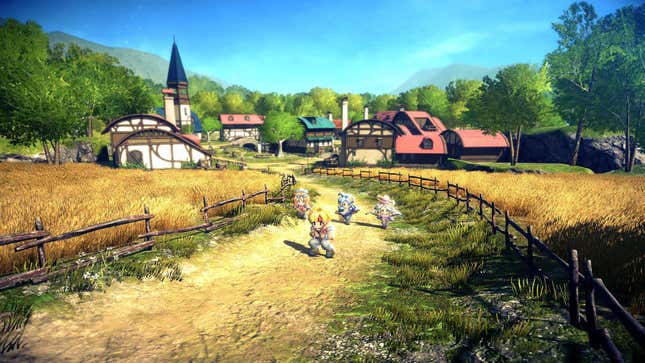
Pure JRPG brain candy, Square-Enix’s re-release of PlayStation 1 classic Star Ocean: The Second Story is a reminder of the joys that can be found in tossing off the shackles of “balance” and letting players break the crap out of a video game and all its attendant systems. The game’s plot, while pleasant, isn’t the point, so much as the pleasures of using its robust and cheerfully exploit-heavy crafting system (complete with some new additions for this latest version) to smash the game to pieces in your favor. By the time you’re using magical cameras to duplicate certificates that let you instantly level characters up as high as you want to take them, while pickpocketing rare materials so you can craft game-breaking weapons in abundance, the joys of SO2 become readily apparent.[William Hughes]
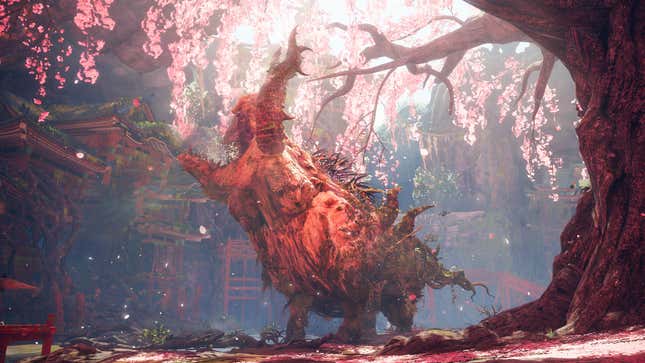
It’s not easy to take on an apex predator in its home territory, but that’s exactly what Omega Force’s Wild Hearts dared to do: Challenging Capcom’s venerable Monster Hunter franchise on its own home turf. The result is a fascinating spin on “you and your friends take down a giant beastie” gameplay, complete with a focus on transforming weapons and tools to exploit the game’s gorgeously realized environments. If Wild Hearts can’t quite match the effortless charm of Capcom’s titles, it puts up a bold assault on the play front, encouraging players to shake themselves out of their comfort zones and pursue new strategies on a regular basis. We’re holding out hope for a Wild Hearts 2; there’s enough room in this space for two titans to duke it out. [William Hughes]
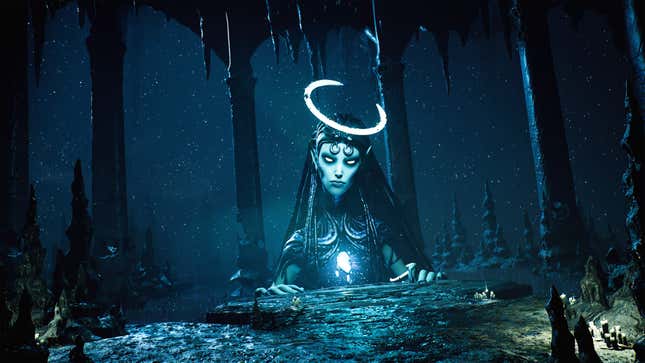
There have been dozens of variants on the venerable Dark Souls formula by now—to the point that “Dark Souls with guns” isn’t even all that novel of a concept. So it’s in the execution, and the ambition, that Gunfire Games’ Remnant 2 triumphs, rather than in a strictly innovative sense: A varied, weird, highly enjoyable run through multiple alternate worlds, Gunfire’s sequel tasks you with traversing procedurally generated landscapes, ideally in co-op, as you craft builds from its varied equipment and class selections. Among other things, Remnant 2 gets big points from us for the confidence with which it’s willing to obscure some of its stranger systems and ideas; it gives the title a depth that belies any sort of more simplistic descriptor we might try to apply to it. [William Hughes]

As companies like Sony and Microsoft make more and more aggressive acquisitions of other video game studios, squeezing the industry into a progressively smaller box just so they can own as much of it as possible, the silver lining is games like Hi-Fi Rush, which absolutely would not exist at all without the freedom afforded by a gigantic parent company and its desire to keep putting new exclusives on its subscription services—Microsoft and Game Pass, in this case. Hi-Fi Rush, from a studio that had previously only ever made horror games, is a cartoony rhythm-based action game where you have to beat up robots to an ever-present beat, with the whole world and all of the characters pulsing and flashing along with the rhythm. It is, in a word, rad. [Sam Barsanti]
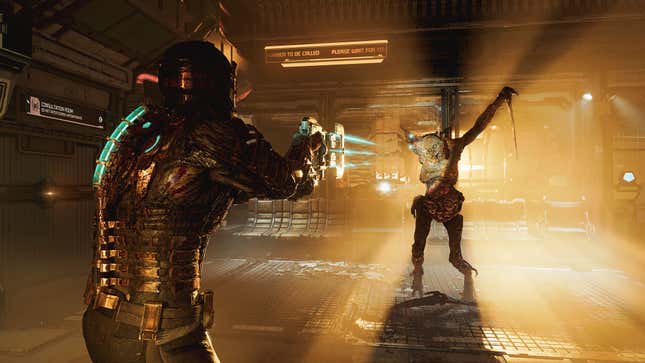
As one of two remakes of classic third-person horror shooters from the 2000s to make our list for 2023 (spoiler!), Dead Space set the template early on. With its resurrected tale of regular space-joe Isaac Clarke’s doomed trip to the USG Ishimura, Motive Studio did much more than slap a new coat of paint over the bloodstains: It emphasized which aspects of the 2008 original’s design were worth saving, and which parts needed tweaking for more modern sensibilities. The result was a horror game that could stand on its own two (soon to be messily severed) feet, while also paying respectful, but not slavish, tribute to a bona fide classic. [William Hughes]
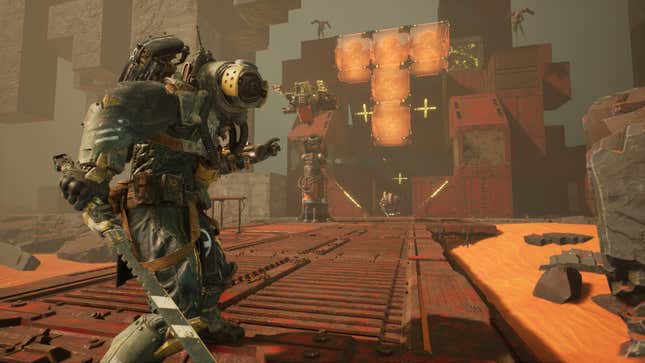
Sometimes all you need is a really good idea—and the collective murderous creativity of a dedicated player base. Meet Your Maker happens to have a really good idea powering it: A 3D, first-person take on Mario Maker, sending players through lethal, trap-filled fortresses designed entirely by other players. With a robust level editor allowing you to create your own hell fortresses to lure the suckers into, a wide array of fiendish devices and protectors to splatter their guts around with, and an absolutely incredible sense of tension, it’s one of the most emotionally evocative games of 2023. There’s nothing that feels quite like hearing the telltale sound of a trap firing behind you, spinning around, and slashing the incoming bolts out of the air—or the slapstick hilarity when some asshole across the country murders you by dumping a dozen bouncing bombs down on your head while you’re sneaking around their base, trying to get that precious GenMat. [William Hughes]
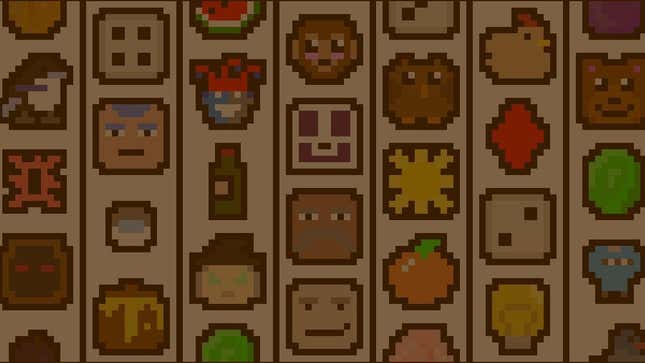
Achieving a full release back in January, after years of early access, TrampolineTales’ Luck Be A Landlord is simultaneously a canny commentary on the nature of capitalism and one of the most addictive “gambling” games ever made. The premise is simple: You need to make rent, and the only way to produce that necessary cash is to spin a slot machine installed in your apartment once a day. Have enough to pay by the time the landlord comes around, and you’re golden (at least, until the next, higher payment comes due). The fun of the game, though, isn’t just the gamble: It’s in the new symbols you’re allowed to add to your machine after every spin, which have interactions that can range from simple—cats make more money if they land next to milk—to hilariously grim and complex. (Shout-out to malevolent Most Dangerous Game hunter General Zaroff, who’ll kill any other “people” symbols he ends up next to, in exchange for cold, hard cash.) Funny, chaotic, and with a deep core of strategy, it’s one of the best “new” roguelike games of the year. [William Hughes]
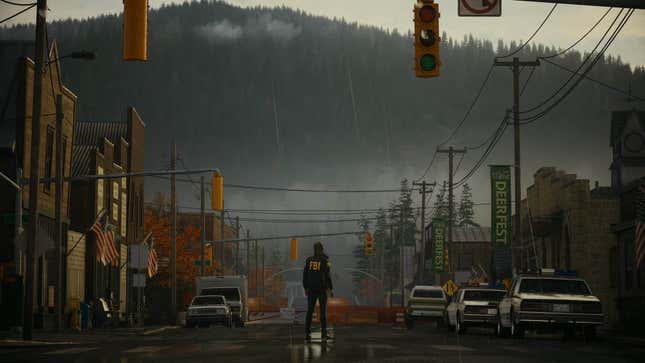
It took Remedy 13 years to make the sequel to cult classic horror game Alan Wake, and not only did the developers pull it off, but they pulled it off so well that Alan Wake II should be all the proof anyone needs that Remedy is one of the best—and most interesting—studios out there. Where else could you find a game that convincingly combines Resident Evil 4-style shooting, live-action interstitials, occasionally obtuse riddle-solving, two math puzzles, an instantly iconic musical sequence, and some truly chilling horror imagery? Not all of it works all the time, but when it does, its among the best things gaming can offer.[Sam Barsanti]
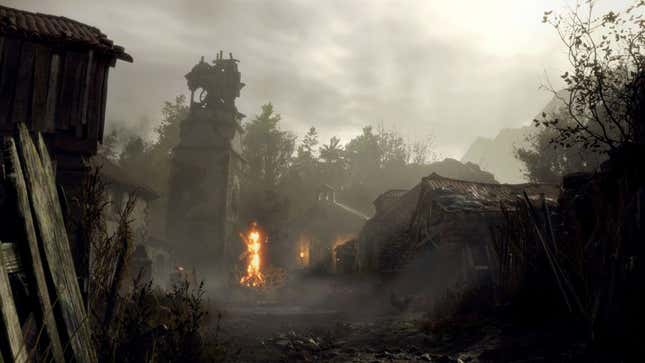
The latest (and, arguably, least necessary) installment of Capcom’s ongoing Resident Evil remake project is, nevertheless, a fantastic game, ably justifying its existence. Most shockingly, the studio managed to shave off some of the awkwardness of the 2005 original without losing the weirdness; Capcom might have dialed back on the “deadly giant statue chases,” but Leon Kennedy is still a major dope, and the game’s tone is still designed to give you whiplash, as it moves between zombie horror, military conflict, and outright, over-the-top camp. More importantly, Capcom has preserved, and refined, the game’s genre-defining shooting gameplay, creating a new title that does the neat trick of playing the way Resident Evil 4 does in your memory, while still holding on to the iconic setpieces that made the original a classic. [William Hughes]

An acquired taste we couldn’t get enough of, the basic premise of Neowiz Games’ Lies Of P is as simple as it is stupid: What if you remade From Software classic Bloodborne, but everything was now Pinocchio? And yet, despite the silliness of it all—and level design that doesn’t do itself any favors by directly inviting references to one of the greatest feats of map design in all of gaming, Bloodborne’s twisty, gorgeous Yharnam—Lies Of P works: The punishing, nuanced combat. The dedication to weird secrets, lurking all across its ruined, puppet-wrecked city of Krat. And even, god help us, its story, which manages to eke some genuine pathos out of its ridiculous, pretty boy puppet version of Pinocchio. A game sincerely better than the sum of its parts, and one of the surprise pleasures of 2023. [William Hughes]

In most years, Insomniac’s follow-up to its first open-world Spider-Man game would have had a decent shot at “game of the year” status. In 2023, though, it’ll have to settle for simply being an immensely well-crafted joyride, as we follow Peter Parker and Miles Morales and their ongoing efforts to carve individual, web-heavy lifepaths for themselves. Insomniac gets points for taking these characters’ internal lives seriously—including both their sillier, and their darker, emotional moments. And it gets lots of points for building on the original game in ways that are almost purely additive, creating a version of New York that is an absolute delight to Spider-Man in, whether you’re webbing across town, using the game’s new gliding abilities to get maximum air, or bouncing across the battlefield, kicking a dozen kinds of crap out of goons without ever touching the ground. [William Hughes]
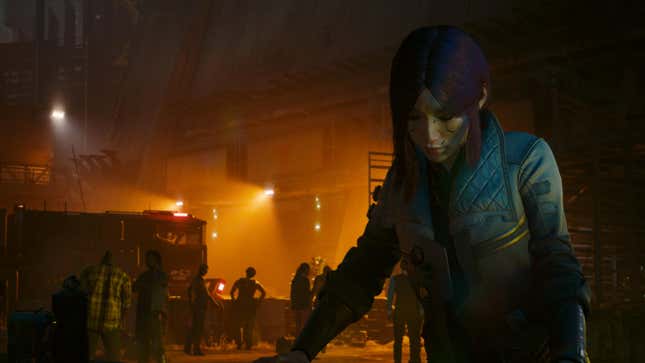
Busted but brilliant Cyberpunk 2077’s first expansion, Phantom Liberty, arrived with a whole bunch of tweaks and fixes meant to tone down the “busted” part of that initial descriptor. Even beyond changes to the game’s AI, skill systems and more, though, Phantom Liberty is a great experience in its own right: A trip into the dark side of Night City’s love of espionage and subterfuge, with a massive map to explore, and a welcome re-immersion into the original game’s fascinating blend of first-person shooting and thoughtful RPG exploration. Even beyond a flashy performance from Idris Elba, though, and the high-concept hook of the premise—the expansion essentially kicks off with you recreating John Carpenter’s Escape From New York, wayward President and all—Phantom Liberty excels in one regard above all others: Maintaining the somber tone of heartbreak and melancholy that’s the secret sauce that makes Cyberpunk a flawed masterpiece instead of just, well, flawed. [William Hughes]

Look, would browser-based indie game The Roottrees Are Dead, by designer Jeremy Johnston, be landing this high on our list if The A.V. Club’s games section wasn’t primarily staffed by obsessive detective gaming nuts? Probably not. But on the plus side, Roottrees really is that refreshing and good. A genealogical mystery in the footsteps of Return Of The Obra Dinn and The Case Of The Golden Idol, the game tasks you with unwinding the complicated family histories of the fabulously wealthy Roottree candy magnate family. Set on a fictitious version of the internet—feeling, in places, like a throwback to games like Hypnospace Outlaw—it’s one of the most concentrated doses of gaming joy we received all year. [William Hughes]

From Software got back to its mech gaming roots in 2023, courtesy of Armored Core VI—our favorite game of the year that also had us tearing our hair out, sometimes for hours at a time. No studio on this planet understands the pleasures of learning a major video game battle better than From, and it’s on clear display in Fires Of Rubicon, which throws walls in the players’ face, not to defeat them, but to emphasize the pleasure of the climb. Fast-moving, strategically designed, and with a story that adopts the company’s typically elegiac approach to writing, it’s a fascinating departure from the studio’s output over the last few years—and a fantastic, brutal adventure in its own right, as much about celebrating the joys of seeing a giant robot swing a laser sword as it is about delicately balancing every aspect of your mech’s build. [William Hughes]
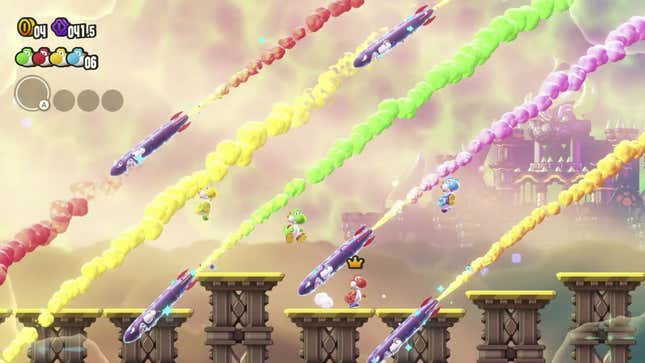
Mario had a good year in movie theaters—but an even better year in gaming, as Nintendo finished out its Very Good 2023 by releasing one of the best new Mario titles in years. 2023 was a year of radical inventiveness for the sometimes-conservative studio, and Wonder’s Wonder Flower is one of the best symbols of that beautiful re-embrace of flexibility, allowing players to transform not just themselves—with the goofy, beautiful new Elephant power-up, among others—but the levels themselves, creating brand new challenges and delights from the remixed parts. Underpinned by the franchise’s classic platforming expertise, Mario Wonder is an aggressively joyful game, whether you’re engaging with its surprisingly fun online multiplayer features, or simply racing through levels, grabbing coins and vaulting flagpoles with a happy “Wa-hoo!” in your heart. [William Hughes]
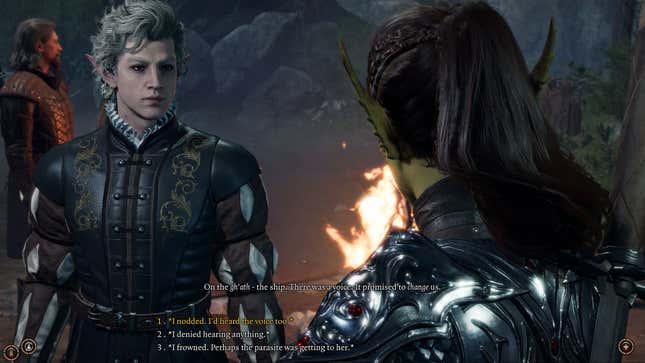
In all our time writing about video games for The A.V. Club, no decision between No. 1 and No. 2 on our annual list has been so tough as the one presented this year, with two absolute masterpieces of inventive, expressive design duking it out at the top. Larian Studios’ Baldur’s Gate III is a revelation: A wide-ranging, incredibly deep trip through Dungeons & Dragons’ Forgotten Realms setting, showing what truly attentive game-making can do for a player base ready to meet it on its own terms. Messy, violent, weird, horny, hopeful, smart, brilliant, and so much more, Baldur’s Gate III not only lives up to, but surpasses, its distant predecessors in the series, inviting its players to push themselves, again and again, to see what kind of crazy tactics or ideas they can pull off—because, more likely than not, Larian has anticipated it, and installed a loving safety net to catch them when they try whatever the next big idea is. Writing this entry, in this very moment, we’re thinking of a dozen little moments or interactions that are urging us to flip the order of these last two entries; grace notes and jokes and player-created moments of chaos, laughter, and triumph. It may not be our game of the year, but it is one of our favorite games, period. [William Hughes]

Nintendo has always built brilliant things from simple parts. But few games in the company’s legendary library have embraced that philosophy like The Legend Of Zelda: Tears Of The Kingdom. Building on the windswept exploration of 2017’s Breath Of The Wild—and then creating something far stranger, more delightful, and expansive from that simple framework—Tears Of The Kingdom is one of the greatest toyboxes in the history of gaming, infused with an irresistible spirit of “go ahead, make your thing.”
At the core of it all is the game’s signature tool, the Ultrahand, which allows franchise hero Link, and the player, to build shockingly elaborate and silly contraptions to solve the myriad puzzles the game’s absolutely massive version of Hyrule places before them. It may not be the most efficient strategy to retrieve a treasure chest by gluing 13 logs together and then whacking the thing off a high ledge with your new club, but Tears Of The Kingdom will let you do it—or build a monster truck to tool around in its stygian depths, or craft giant edifices to keep the stupid sign man from falling over, or build, on the fly, murder robots that will roam enemy outposts, firing rocket launchers at the assembled Moblins because they’re too hard to take out with your piddly little swords. And all of that, and more, is why Tears Of The Kingdom is the finest game of 2023: Because it doesn’t just showcase creativity, but inspires it, encouraging players to try things that most games wouldn’t let them get away with, pushed forward by the enticement inherent to a simple, robust set of player tools. Part physics toy, part dogfighting simulator, part “insert-a-dozen-other-games-within-a-game-you-could-make-up-here,” TOTK embodies those principles that make Nintendo great; it is a series of simple parts that add together to make a complex and near-perfect whole. [William Hughes]
